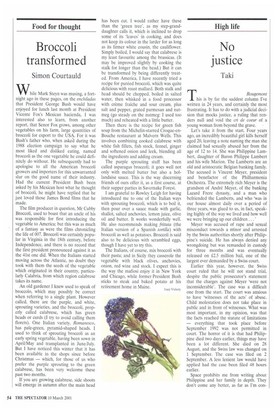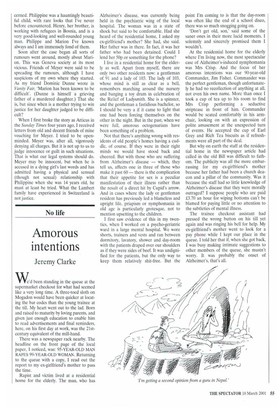High life
No justice
Taki
TRougemont his is by far the saddest column I've written in 24 years, and certainly the most frustrating. It has to do with a judicial decision that mocks justice, a ruling that renders null and void the en de coeur of a young woman from beyond the grave. •
Let's take it from the start. Four years ago, an incredibly beautiful girl kills herself aged 20, leaving a note naming the man she claimed had sexually abused her from the age of 12 to 14. She was Philippine Lambert, daughter of Baron Philippe Lambert and his wife Marion. The Lamberts are an old and aristocratic Belgian banking family. The accused is Vincent Meyer, president and benefactor of the Philharmonia Orchestra. The extremely rich Meyer is the grandson of Andre Meyer, of the banking Lazard Frere dynasty, and a man who befriended the Lamberts, and who 'was in our house almost daily over a period of three years, was glued to us, in fact, speaking highly of the way we lived and how well we were bringing up our children ... '
Meyer was accused of rape and sexual misconduct towards a minor and arrested by the Swiss authorities shortly after Philippine's suicide. He has always denied any wrongdoing but was remanded in custody for three months and was eventually released on £2.5 million bail, one of the largest ever demanded by a Swiss court.
Earlier this year, however, the Swiss court ruled that he will not stand trial, despite the public prosecutor's statement that the charges against Meyer 'were not inconsiderable'. The case was a difficult one from the start. The court was anxious to have 'witnesses of the acts' of abuse. Child molestation does not take place in public and in front of witnesses. What was most important, in my opinion, was that the facts reached the statute of limitations — everything that took place before September 1992 was not permitted in court. The horror of it is that had Philippine died two days earlier, things may have been a lot different. She died on 28 August, and the Swiss law was changed on 1 September. The case was filed on 2 September. A less lenient law would have applied had the case been filed 48 hours earlier.
Space prohibits me from writing about Philippine and her family in depth. They don't come any better, as far as I'm con cerned. Philippine was a hauntingly beautiful child, with rare looks that I've never before encountered. Henry, her brother, is working with refugees in Bosnia, and is a very good-looking and well-rounded young man. Philippe and Marion I've known always and I am immensely fond of them.
Soon after the case began all sorts of rumours went around, mostly about Marion. This was Geneva society at its most vicious. Friends of Meyer were said to be spreading the rumours, although I have suspicions of my own where they started. As my friend Dominic Dunne wrote in Vanity Fair, 'Marion has been known to be difficult'. (Dunne is himself a grieving father of a murdered daughter.) That she is, but since when is a mother trying to win justice for her daughter judged to be difficult?
When I first broke the story as Atticus in the Sunday Times four years ago, I received letters from old and decent friends of mine vouching for Meyer. I tried to be openminded. Meyer was, after all, vigorously denying all charges. But it is not up to us to judge innocence or guilt in such situations. That is what our legal systems should do. Meyer may be innocent, but when he is accused in a dying girl's last words and has admitted having a physical and sensual (though not sexual) relationship with Philippine when she was 14 years old, he must at least be tried. What the Lambert family have experienced in Switzerland is not justice.



































































 Previous page
Previous page